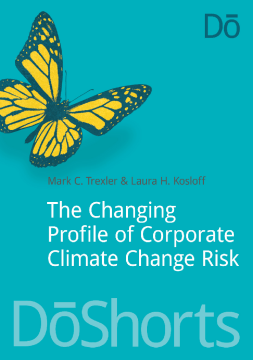
Additional Information
Book Details
Abstract
This DōShort will help business executives to (1) rethink their perceptions of climate risk (2) evaluate whether their company is effectively positioned, and (3) make informed and prudent business decisions about climate change risk in an environment rife with policy uncertainty. Business risk associated with climate change is commonly assumed to be primarily policy driven. Many companies internalize the current stalemate over global climate policy into a perception that climate risk is no longer a critical issue. Business climate risks, however, include: Operational and Supply Chain (Physical) Risk, Brand Risk, Market-driven Structural Risk, Liability Risk. As national and global policy to materially reduce climate change is delayed, it is business-prudent to assume that the level of climate risk is increasing. Even if policy risk might seem lower today than a few years ago, political will can change quickly. Should physical impacts of climate change manifest in dramatic ways, for example, draconian climate policy is likely to follow quickly. These conditions create a complex and shifting business risk environment, and most companies either overlook or substantially underestimate key climate risks. How many companies, for example, are positioned for material climate change outcomes, whether physical or regulatory? Companies with little climate change exposure may not face much downside risk from taking a wait-and-see approach. For those with greater exposure, being “too late” to respond will mean costs and competitive impacts that could have been avoided. Being “too early,” however, can mean being penalized later for actions that reduce a company’s emissions today, or competitive disadvantage from getting too far out in front of competitors.
"Dr. Trexler and Ms. Kosloff make a compelling case for why a smart business executive should consider climate change risk when developing a corporate strategy. They introduce concepts like the five elements of business climate change risk and the climate response tipping point, which are key to understanding the true nature of the problem from a business perspective. Strategic risk management is all about developing a corporate strategy that will enable the company to thrive under a range of possible futures; climate change risk substantially broadens that range. Rather than arguing over exactly what the ramifications of climate change will be – i.e., trying to predict the future – it makes far more sense to deal with climate change for what it is: an uncertainty to be taken into account when developing one’s strategic plans."
PATRICK LEACH, CEO, Decision Strategies, Inc.
"As the gap between accepted climate science and acceptable climate policy continues to grow, corporate risk from climate climate change increases accordingly. Whether its the physical effects of climate change -- think super-regional droughts, scarce water resources, transport and food supply disruptions -- or the risks from rapid regulatory or policy swings, corporations must recognize and prepare for climate change risks. Mark Trexler and Laura Kosloff use their 20+ years of work on climate change to put these risks into perspective and provide a clear-eyed way to think about climate risk, mitigation and adaptation. For senior executives who have not yet steeped themselves in climate change, this will be an informative and sobering read. For the risk managers whose job it is to think about corporate risks, it provides a terrific framework for climate risk analysis."
BILL BUMPERS, William Bumpers, Head of Climate Change Practice for Baker Botts LLP
"Trexler and Kosloff have written an essential text for every business and investor struggling to understand the strategic and financial implications of climate change. While climate policy may remain uncertain, climate change and its consequences are all too real. Trexler and Kosloff provide practical suggestions for coming to grips with this new reality which institutions like ours have only just begun."
ALAN MILLER, Principal Climate Change Specialist, International Finance Corporation
“Climate change, and policies to manage it, present a tremendous challenge of risk management for many businesses. Mark Trexler and Laura Kosloff offer an extremely insightful analysis of how to understand and manage corporate climate risk.”
DR SIMON DIETZ, Grantham Research Institute on Climate Change and the Environment, LSE
